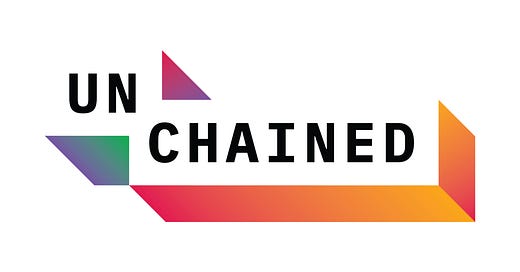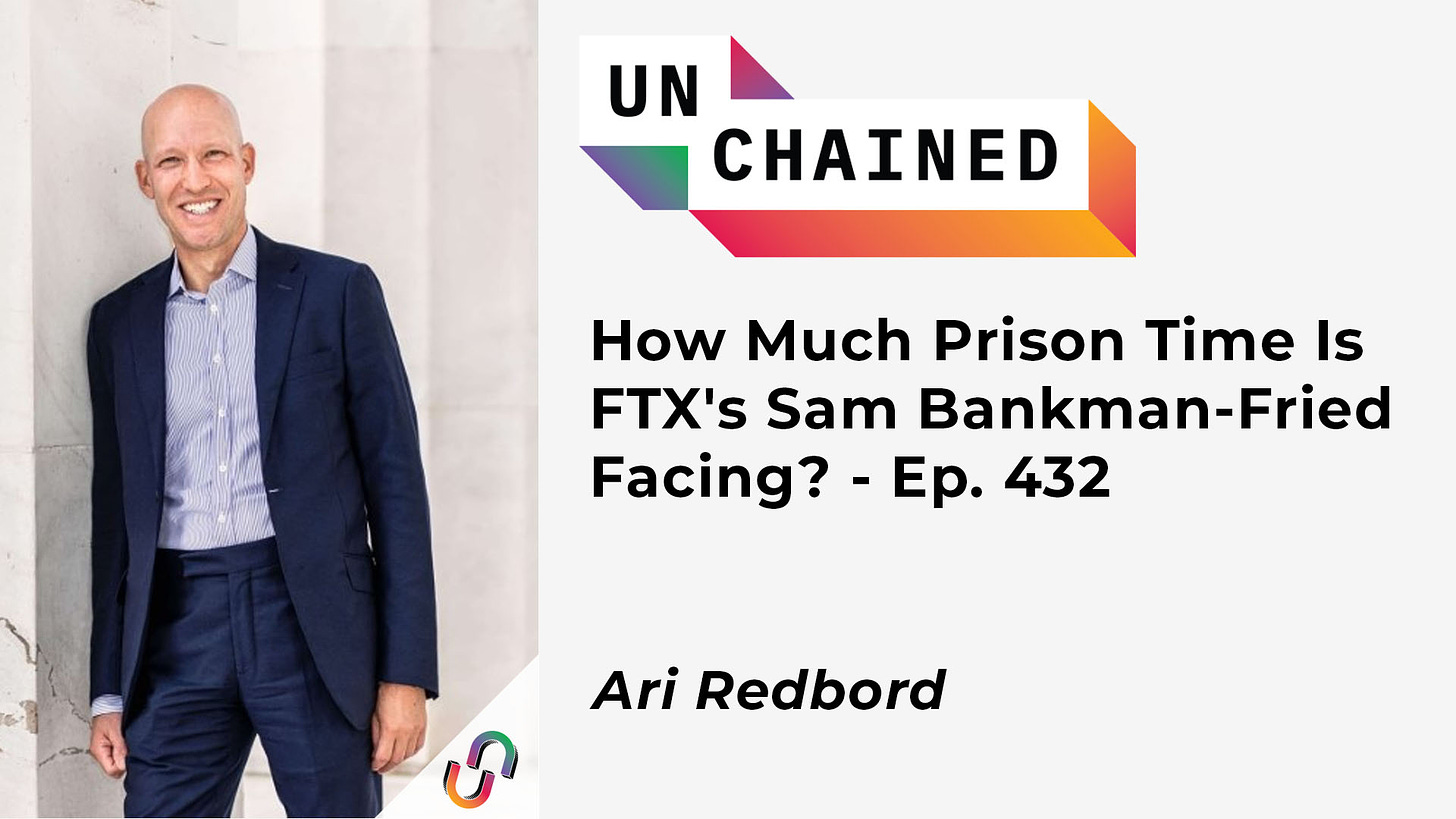Binance Is Under Scrutiny; New Crypto Bill Roils Community
Weekly News Recap: SBF’s roundup, The Block CEO resigns, Do Kwon's whereabouts, Maple Finance's decision, Trump's NFTS, and more!
Wait, why am I receiving two emails in one day?
On Unchained, we run two newsletters: the daily ones, which go from Monday through Saturday, and the weekly (this one!) which recaps all the news in the crypto ecosystem in the past week. (It’s narrated in audio form on the podcast, so if you’re looking for the links to those stories heard on the show, they’re all in here!)
If you want to receive only one of the newsletters (for example, receive the daily and not the weekly, or vice versa), you can 100% do it.
How? Just go here and select whichever you want!
Weekly News Recap
What a dramatic week. Sam Bankman-Fried was arrested Monday night, and three government agencies revealed charges against him the next morning. Given the eight criminal charges, I was wondering how long SBF’s prison sentence could be.
Suffice it to say, it’s an uncomfortably long number. In Friday’s episode of Unchained, Ari Redbord, formerly of DOJ and now at TRM Labs, explained why authorities moved to arrest him quickly, whether their motivation was to stop him from testifying to Congress Tuesday morning, and what factors could potentially reduce SBF’s prison time.
“Those regulatory cases, the civil actions — those are about money. They are ultimately enforcement actions about trying to get restitution for victims or ultimately a fine,” said Redbord. “Those will take a backseat to the DOJ criminal prosecution, because that case involves potential incarceration, deprivation of liberty, the types of things that sort of go first.” Be sure not to miss this episode to understand how SBF’s case could play out.
SBF/FTX Roundup
While we spoke a lot about Bankman-Fried and FTX during the show, there are a few other things that happened this week concerning FTX.
A committee has been established to represent unsecured creditors of FTX and more than 100 affiliated companies in the U.S. bankruptcy proceedings. The committee will serve as a voice for FTX customers in court and allow the proceedings to move forward.
The White House declined to comment on whether it would return campaign donations by Bankman-Fried to President Joe Biden or whether other elected officials should return similar donations.
Financial institutions are looking to buy claims from FTX customers, so they can receive payouts now rather in years. Investors such as Apollo Global Management and Attestor have shown interest, and 507 Capital has already purchased claims from hedge funds seeking quick exits from FTX.
Before FTX filed for bankruptcy, crypto exchange BitGo, the custodian of wrapped Bitcoin (WBTC) prevented Alameda Research from selling $50 million worth of the wrapped coin.
The CFTC complaint against SBF alleged that, in September, SBF contemplated closing down Alameda, noting that it wasn’t making enough money.
Lawyers representing the new management of FTX, directed by new CEO John Ray III, urged a bankruptcy judge to deny lawyers for FTX Digital Markets, FTX’s Bahamas-based entity, access to the computer systems of that subsidiary, contending that the Bahamian government and FTX executives had transferred assets illicitly in an effort to avoid the US bankruptcy process.
Bankman-Fried is also being accused of creating and transferring hundreds of millions of dollars of digital tokens to Bahamian government officials by his FTX's appointed bankruptcy team, Bloomberg reported. The complaint alleges that Bankman-Fried had an "alarmingly chummy" relationship with Bahamian liquidators.
The Financial Times reported that Ryan Salame, the former co-CEO of FTX, tipped off Bahamian authorities that FTX had misused customer funds to prop up Alameda’s failed trading.
At a hearing Tuesday for the House Financial Services Committee, Ray revealed that FTX’s staff used consumer-level tax software QuickBooks for accounting as well as Slack for invoicing and expenses, which caused not only consternation but also laughter.
Binance Passes a ‘Stress Test,’ But Faces Financial and Regulatory Headwinds
After Binance issued its Proof-of-Reserves report last week, with many noting that it was not a true audit, Binance has been facing doubts about its solvency. Despite these fears, over $3 billion worth of crypto assets were withdrawn from the exchange with no major problem.
This is in an environment in which investors are withdrawing unprecedented amounts of cryptocurrency from trading platforms.
In an interview with CNBC on Thursday, Binance CEO Changpeng Zhao clarified why the exchange temporarily halted USDC withdrawals earlier this week. Zhao explained that the New York bank that helps swap Paxos-issued BUSD to USDC was not open at the time. He said Binance does not need margin or leverage to be able to convert USDC holdings into Paxos-issued BUSD.
Additionally, CZ warned his staff that the crypto industry is headed for tough times and reassured them that Binance would be in a strong financial position to weather the storm. He said that the company faced extra scrutiny following the FTX collapse and customer withdrawals, but that Binance would survive the "crypto winter" and come out stronger than before.
This week, Reuters reported that prosecutors in the US Department of Justice are split over whether to charge Binance, which has been under criminal investigation since 2018, for allegedly facilitating money laundering and sanctions violations on its platform. Binance has denied the allegations, claiming they are compliant with anti-money-laundering regulations.
New Crypto Bill Targeting Blockchain Infrastructure Players Outrages the Industry
Senators Elizabeth Warren and Roger Marshall proposed a bill to increase US anti-money laundering rules for digital assets. The bill would require all entities that facilitate the running of blockchain networks to record personally identifying information on users, and prohibit them from using and interacting with crypto mixers on decentralized networks. In their joint statement, the senators said that the same common-sense rules should apply to the crypto industry as applies to banks, brokers and Western Union.

The proposed bill roiled the crypto community. Peter Van Valkenburgh, research director at crypto think-tank Coin Center, said: “[the bill] is the most direct attack on the personal freedom and privacy of cryptocurrency users and developers we’ve yet seen. It would force anyone who helps maintain public blockchain infrastructure.”
Neeraj K. Agrawal, director of communications at Coin Center, added: “Nothing about the bill would prevent the next FTX. In fact, it puts users at more risk.”
Additionally, the Financial Stability Board, the world’s leading global financial watchdog group, is reportedly developing an operational framework to regulate the crypto sector to be unveiled in early 2023.
Dietrich Domanski, the Secretary General of the FSB, noted that this work plan would “reflect the urgency” needed for supervising digital assets and decentralized finance. However, Domanski cautioned against rushing into decisions without first understanding the nuances of the crypto markets.
On a similar note, Reuters reported that economic leaders of the G20 are gathering in Bengaluru, India to develop an agreement on policy for crypto assets and provide guidance to global regulators.
The Block CEO, Who Secretly Took Loans From SBF, Steps Down
Michael McCaffrey resigned as CEO of The Block, a crypto media outlet, after it came out to light that the company was secretly funded over the last two years by Sam Bankman-Fried's Alameda Research.
Alameda gave three loans worth $43 million, which McCaffrey used to buy out other investors, fund day-to-day operations, and purchase real estate in the Bahamas for himself. Bobby Moran, The Block's former chief revenue officer, has stepped into the role of CEO.
McCaffrey has not been accused of trying to influence The Block's newsroom or research teams, particularly in their coverage of SBF, FTX, and Alameda Research.

Do Kwon Is Believed to Be in Serbia
Do Kwon, the founder of the collapsed Terra ecosystem, has fled to Serbia via Dubai, according to a CoinDesk Korea report on Monday.
In previous weeks and months, South Korea said it had issued an arrest warrant and Interpol red notice for the co-founder, alleging violations of the Capital Markets Act of the country. The Seoul Southern District Prosecutor's office reported Monday that Kwon is in Serbia, with the Ministry of Justice requesting Serbian authorities for assistance in the investigation.
Maple Finance Ends Support for Solana to Focus on Ethereum
Maple Finance, a crypto platform that has suffered tremendously since the collapse of FTX, has announced that it is ending support for the Solana blockchain in its 2023 strategy. The undercollateralized lending protocol will instead focus on Ethereum, which it is calling the "dominant chain."
The team cited Ethereum's transition to Proof-of-Stake and its thriving ecosystem as motivating factors for their decision. This comes in the wake of a decrease in Total Value Locked (TVL) from $900 million to $290 million on Solana, as well as a decrease in Ethereum's TVL from $100 billion to $24 billion due to industry-wide black swan events this year. In response, Maple Finance is planning to upgrade its protocol to version 2.0, which will aim to increase opportunities on-chain by introducing features such as diversifying with real-world assets, as well as giving pool delegates the ability to declare early default and liquidate loans if a borrower doesn't pay within a certain period.
Tether Will Remove Secured Loan Backing in 2023
USDT-issuer Tether announced plans to remove secured loans from the stablecoin’s backing in 2023, following concerns that the company won’t be able to honor redemptions in the event of a bank run.
"Tether is professionally and conservatively managed, and this will be demonstrated once again by successfully winding down the lending business without losses — since all loans are over-collateralized by liquid assets," the company said in a statement.
BTC Miners Are in Distress
The Bitcoin mining industry is struggling to remain profitable in this bear market.
In November, Bitcoin mining hit its lowest profitability since 2014. Due to the crypto winter, high electricity costs, and miners switching to more profitable altcoins, the profitability of Bitcoin mining stands at only $0.05/day for 1 THash/s, Bankless Times reported.

Investment bank B. Riley Financial offered to provide Core Scientific $72 million in financing to help the company remain viable and avoid bankruptcy. In response, the company's shares skyrocketed 94%.
Bitcoin miner CleanSpark reported significantly less than expected revenue of $26.2 million in the three months ending in September, missing the average estimate of $27.1 million. Additionally, the company reported a much larger net loss than expected, at $42.3 million compared to the estimated $15.4 million.
Moreover, a class-action lawsuit has been filed against Bitcoin miner Iris Energy (IREN) after the firm said its revenue was not enough to satisfy its financing commitments.
Lastly, bitcoin mining company Argo accidentally published a document that suggested it might file for Chapter 11 bankruptcy. While this was not actually the case, the firm is looking to sell off assets and take out a loan in an effort to prevent bankruptcy.
Coinbase to Support Mistakenly Sent ERC-20 Tokens
Over the years, Coinbase users sent many unsupported ERC-20 tokens to the exchange, only to have them disappear into the ether. Now, the exchange will help users recover any such assets worth more than $100 for a fee of 5%. Coinbase claims it is the first major crypto company to offer the recovery of such assets.
Justin Sun Deploys Capital
Justin Sun, the billionaire founder of the Tron blockchain, mimicked Do Kwon’s infamous tweet and said he was “deploying more capital” amid fears that Tron’s native stablecoin USDD would depeg.
In response to USDD dropping to its lowest point ever of $0.97, Sun acquired roughly $773,000 worth of the coin to prevent a deeper depeg from the US dollar.
USDD is an algorithmic stablecoin and its market cap currently stands at $711 million and is the eighth-largest stablecoin.
Fun Bits
$78 Worth of Tokens Sparks a Lawsuit
Compound DAO and Compound cofounders Robert Leshner and Geoffrey Hayes are being sued for allegedly selling unlicensed securities and causing the plaintiffs to suffer damages by holding COMP tokens.
You might be wondering, what’s funny about this? The value of the tokens held by these people is under $100. The value of the COMP token when purchased by plaintiffs Amanda Houghton, Susan Franklin and Charles Douglas, is, respectively, $75, $3, and $2.
Trump Wants Some Company for Dinner?
Donald Trump launched a collection of 45,000 fantasy non-fungible tokens (NFTs) for sale on Truth Social, the platform he founded after he was blacklisted from Twitter, Facebook, and others.

🔗Join Unchained Premium to get access to:
Behind-the-scenes interviews, in which I talk with crypto experts and entrepreneurs to learn all about the latest developments in the industry.
A subscriber-only Telegram group, where you can talk with the other members of the Unchained community, build a network in crypto, and talk directly with me and the Unchained team!
And now, a new offering: transcripts of all the shows, for subscribers only.
If you liked what you read:
👍 follow me on Facebook, Instagram, Twitter, LinkedIn and/or Medium
🎧 subscribe to Unchained on YouTube, Apple Podcasts, Spotify, Google Podcasts, Pandora or wherever you get your podcasts
and/or 📚buy my book, The Cryptopians: Idealism, Greed, Lies, and the Making of the First Big Cryptocurrency Craze








